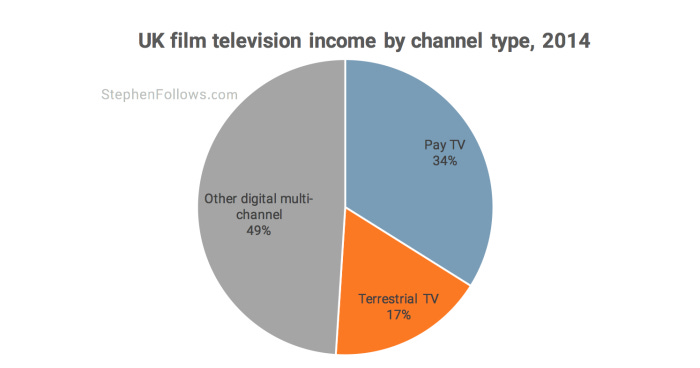How important is television income for filmmakers?

Today's question comes from Craig, who is a filmmaker from Glasgow. He emailed me to ask about the value of television rights to filmmakers.
He had read my breakdown of the income from indie film Papadopoulos & Sons and noted that the television distribution rights brought in far more money than theatrical, DVD and Video On Demand (VOD). "Is this normal?" he asked.
The short answer is, yes, television rights are currently the largest source of income for feature films. The slightly longer answer is that each film will have a different income pattern, and some will earn more on other platforms than they do from television.
I took a look at the numbers behind television income for films in the UK. In summary...
Television is the largest source of money for feature films
On average, over a third of the income a film makes will be via selling its television rights
In 2014, gross film revenues from television reached £1.4 billion
Out of all UK terrestrial broadcasters, Channel 4 screens the most movies
40% of the films screened on ITV are UK films (compared with just 13% of those on BBC One)
Films on television
Across all platforms in 2014, television provided 36% of all the money earned by films in the UK.

When we break this down further, we can see that the majority of the UK television income comes from digital channels.

How have UK television revenues changed over time?
When inflation-adjusted to 2014 pounds, television revenues over the past two decades were at their highest in 2013 (£1,583 million).

Has television always been film's top income stream?
Between 1998 and 2001, television was the top income stream, but in 2002 Physical Retail took over, thanks to booming DVD sales. Physical sales reigned supreme for ten years and it wasn't until 2012 that television regained its crown.

Which major UK TV channel screens the most films?
Of the five terrestrial channel, Channel 4 screens the largest number of films (543 in 2014). However, only 15% of Channel 4's film screenings were of UK films, compared with over 40% of ITV's film screenings. 13% of the films BBC One screened in 2014 were UK films, 29% of BBC Two films and 13% of Channel 5 screenings.

Which channels rely on films at prime-time?
While Channel 4 may screen the most films, it's Channel 5 which seems to rely most on films to fill their peak viewing hours (i.e. 5:30pm until 11pm).

Data for today's look at television income
Much of today's data came from the BFI, along with data from Rentrak, the British Video Association, Official Charts Company, Attentional, IHS and the Office for National Statistics (for UK inflation figures).
Epilogue
It will be interesting to see what happens to films on television as streaming services such as Netflix and Amazon Prime continue to grow. Perhaps the idea of time-based screenings will be as bizarre to future generations as VHS already does to modern kids.
[youtube id=kesMOzzNBiQ]


